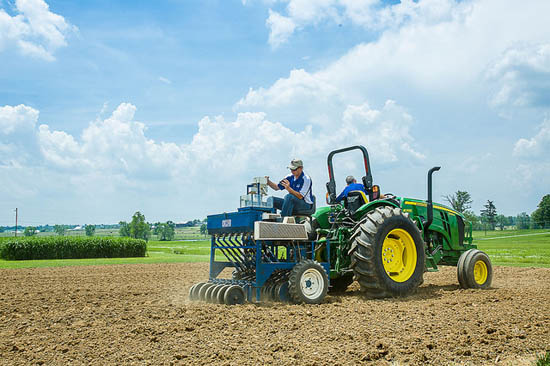UK researchers plant hemp
UK researchers plant hemp

Scientists with the University of Kentucky College of Agriculture, Food and Environment recently planted the first industrial hemp research trials in many decades at Spindletop Research Farm.
Kentucky was a leading hemp producing state before the crop was outlawed in the United States due to its similarity to marijuana.
The UK project is one of the Kentucky Department of Agriculture’s pilot studies and is being conducted in conjunction with Eastern Kentucky University and Kentucky State University.
“The University of Kentucky’s pilot program will help us recover much of the knowledge about industrial hemp production that has been lost since hemp was last grown in Kentucky,” Kentucky Agriculture Commissioner James Comer said. “I’m grateful to UK and the other institutions that are participating in the hemp pilot programs. With their help, we will bring industrial hemp back to Kentucky and, with it, new jobs and new farm income.”
“We are pleased to be on the ground floor of investigating industrial hemp in the 21st century under the leadership of KDA,” said Nancy Cox, dean of the UK College of Agriculture Food and Environment. “As a land-grant university we have developed many tools for agronomic evaluations, which we will apply in full force with our new partners.”
 The study is a joint effort between the UK Department of Plant and Soil Sciences and the Kentucky Tobacco Research and Development Center led by UK agronomists David Williams and Rich Mundell. The study includes three trials. Researchers will manage two trials for fiber production and one for seed production.
The study is a joint effort between the UK Department of Plant and Soil Sciences and the Kentucky Tobacco Research and Development Center led by UK agronomists David Williams and Rich Mundell. The study includes three trials. Researchers will manage two trials for fiber production and one for seed production.
They will identify varieties best suited to production in Kentucky, quantify yields of both seed and fiber, and assess any potential weed, disease and insect problems. One of the trials will also determine the effects of nitrogen fertilizer on the crop.
“We are particularly interested in how the differences in latitude and climate might affect the flowering of these cultivars, which will define their adaptation for seed production,” Williams said. “These trials are essentially identical in design and execution to standard variety trials for any commodity.”
Even though Kentucky used to be a leading producer of hemp, variety trials are necessary, as agriculture has changed a lot since hemp was last planted in the state.
“If laws and regulations permit, farmers can use the information from these trials to make informed decisions regarding their selection of varieties for either fiber or seed production in Kentucky,” Williams said.
Researchers will use a standard research seed drill to plant the crop. Williams said potential producers would be able to use their pre-existing seed drill with just a few relatively inexpensive modifications.
Hemp fibers and oils can be used to make many products including cosmetics, paper, clothing, and animal feed and bedding.
UK researchers plan to harvest the crop in October. Plant parts not used to measure yield will be destroyed following the harvest. Parts used in measuring yield will be destroyed after researchers collect data.
Research

